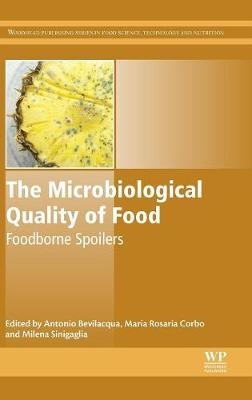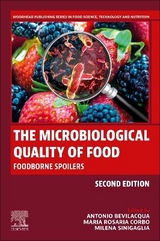
The Microbiological Quality of Food
Woodhead Publishing Ltd (Verlag)
978-0-08-100502-6 (ISBN)
- Titel erscheint in neuer Auflage
- Artikel merken
Divided into four sections, the first section defines microbial spoilage of food, with special emphasis on methods for the evaluation of spoiling phenomena and the status of their regulatory framework, examining both existing regulations and possible gaps. The second section examines spoiling microorganisms, covering a range of common spoilage microorganisms, including pseudomonas, yeasts, and molds and spore formers, as well as less-common spoilers, including lactic acid bacteria and specific spoilage organisms in fish.
The third section highlights spoiling phenomena within certain food types. Chapters cover dairy, fish, meat, and vegetables, and other products. The final section investigates emerging topics which point to future trends in the research of food spoilers. There is insight into microorganisms resistant to preservation, the role of biofilms in food quality, and the link between food safety and food spoilage, with a special emphasis on certain spoiling microorganisms which could be opportunistic pathogens. Written by an international team of leading authors, this book provides state-of-the-art coverage of this topic, which is essential to the shelf-life and quality of food.
Dr. Antonio Bevilacqua is a researcher in food microbiology. He has received an MSc in Food Science and Technology and a PhD in Food Biotechnology (University of Foggia); the main topics of his research activity are table olives, fermented meat and micro-encapsulation, predictive microbiology (namely the use of the theory of the Design of Experiments and multivariate approaches), natural antimicrobials and alternative tools for food preservation, microbiology of starter cultures. He is the author of c. 150 papers. Prof. Maria Rosaria Corbo is Associate Professor of Microbiology; she gained an MSc in Biology in the University of Bari (Italy) and a PhD in Food Biotechnology in the University of Foggia. Her research topics covers a wide range in food microbiology (minimally processed foods, fermented meat and fish, fermented vegetables, natural antimicrobials, homogenization and ultrasound as tools for food preservation, predictive microbiology); she is the author of c. 200 papers. Prof. Milena Sinigaglia is the Professor Head of the Section of Predictive Microbiology; she received an MSc in Agricultural Science and a PhD in Food Biotechnology in the University of Bologna (Italy). She is Associate Editor for the Italian Journal of Food Science and her research topics cover a wide range (mathematical modeling of foodborne bacteria, natural antimicrobials and alternative approaches in food preservation, fermented foods). She is the author of c. 250 papers.
Chapter 1. Microbial Spoilage of Foods: Fundamentals
Part I: The Spoilers
Chapter 2. Pseudomonas and Related Genera
Chapter 3. Specific Spoilage Organisms (SSOs) in Fish
Chapter 4. Spore-Forming Bacteria
Chapter 5. Yeasts
Chapter 6. Molds
Part II: A Focus on Food Spoilage
Chapter 7. Spoilage of Milk and Dairy Products
Chapter 8. Spoilage of Meat and Fish
Chapter 9. Review of Vegetable Fermentations With Particular Emphasis on Processing Modifications, Microbial Ecology, and Spoilage
Chapter 10. Wine Spoiling Phenomena
Part III: Future Trends in Food Spoilers
Chapter 11. The Impact of Biofilms on Food Spoilage
Chapter 12. Food Spoilage and Food Safety: Is There a Link?
| Erscheinungsdatum | 28.11.2016 |
|---|---|
| Reihe/Serie | Woodhead Publishing Series in Food Science, Technology and Nutrition |
| Verlagsort | Cambridge |
| Sprache | englisch |
| Maße | 152 x 229 mm |
| Gewicht | 490 g |
| Themenwelt | Technik ► Lebensmitteltechnologie |
| ISBN-10 | 0-08-100502-4 / 0081005024 |
| ISBN-13 | 978-0-08-100502-6 / 9780081005026 |
| Zustand | Neuware |
| Informationen gemäß Produktsicherheitsverordnung (GPSR) | |
| Haben Sie eine Frage zum Produkt? |
aus dem Bereich



